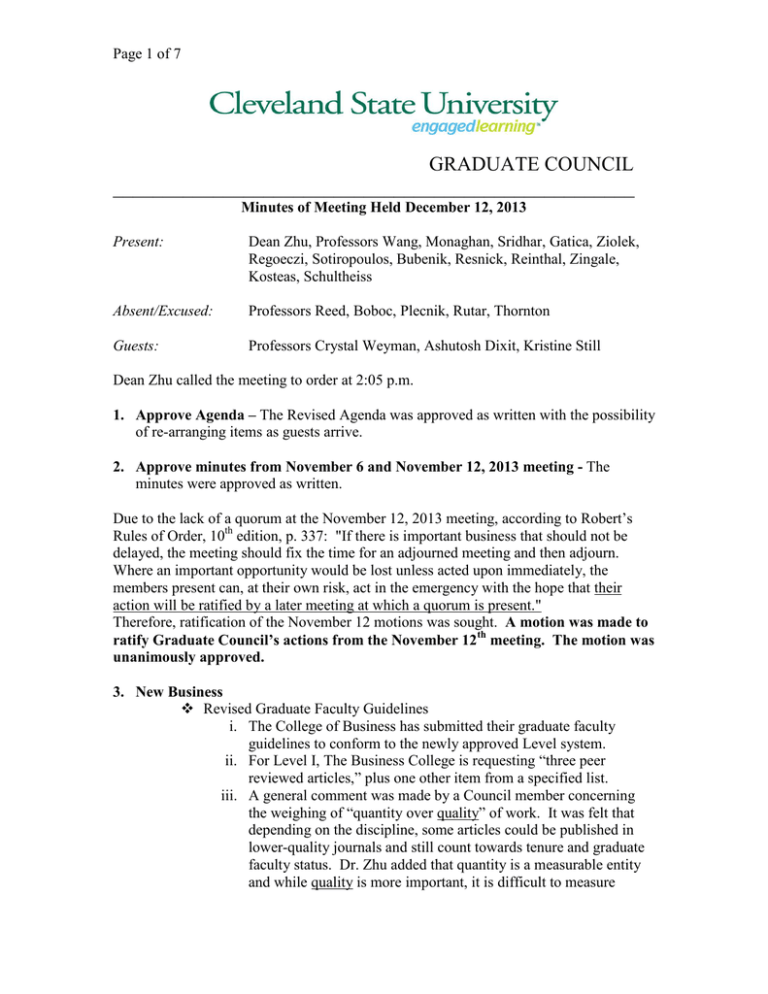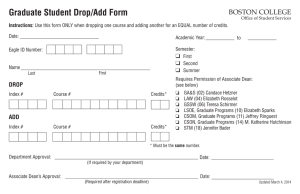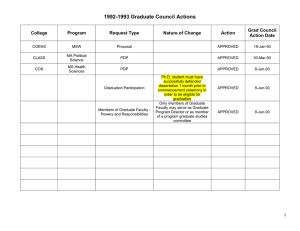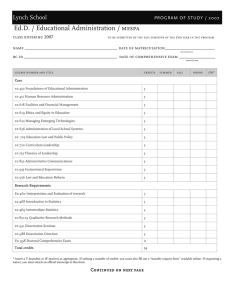GRADUATE COUNCIL ____________________________________________________
advertisement

Page 1 of 7 GRADUATE COUNCIL ____________________________________________________ Minutes of Meeting Held December 12, 2013 Present: Dean Zhu, Professors Wang, Monaghan, Sridhar, Gatica, Ziolek, Regoeczi, Sotiropoulos, Bubenik, Resnick, Reinthal, Zingale, Kosteas, Schultheiss Absent/Excused: Professors Reed, Boboc, Plecnik, Rutar, Thornton Guests: Professors Crystal Weyman, Ashutosh Dixit, Kristine Still Dean Zhu called the meeting to order at 2:05 p.m. 1. Approve Agenda – The Revised Agenda was approved as written with the possibility of re-arranging items as guests arrive. 2. Approve minutes from November 6 and November 12, 2013 meeting - The minutes were approved as written. Due to the lack of a quorum at the November 12, 2013 meeting, according to Robert’s Rules of Order, 10th edition, p. 337: "If there is important business that should not be delayed, the meeting should fix the time for an adjourned meeting and then adjourn. Where an important opportunity would be lost unless acted upon immediately, the members present can, at their own risk, act in the emergency with the hope that their action will be ratified by a later meeting at which a quorum is present." Therefore, ratification of the November 12 motions was sought. A motion was made to ratify Graduate Council’s actions from the November 12th meeting. The motion was unanimously approved. 3. New Business Revised Graduate Faculty Guidelines i. The College of Business has submitted their graduate faculty guidelines to conform to the newly approved Level system. ii. For Level I, The Business College is requesting “three peer reviewed articles,” plus one other item from a specified list. iii. A general comment was made by a Council member concerning the weighing of “quantity over quality” of work. It was felt that depending on the discipline, some articles could be published in lower-quality journals and still count towards tenure and graduate faculty status. Dr. Zhu added that quantity is a measurable entity and while quality is more important, it is difficult to measure Page 2 of 7 quality in practice. Another Council member mentioned that at some top schools depending on the discipline, journal articles aren’t counted at all, but often conference proceedings carry more weight. iv. A motion was made to approve the College of Business graduate faculty guidelines, which passed unanimously. Sabbatical replacement for Eric Ziolek for Spring semester – Dr. Angelin Chang (Music Dept.) has been recommended and was unanimously approved by Council. BGES 4-3 course revisions i. Three EVS courses (EVS 523, 525, 527) are being changed from 4 credits to 2 credit lecture courses and 2 credit lab courses. ii. The courses are cross-listed and the undergraduate courses have been approved. iii. Dr. Weyman pointed out a few minor typos in the document and went over the corrections. iv. A Council member asked about graduate students being held to a higher standard as well as being given an extra assignment. This issue will be revisited at a later date and the criteria for the syllabi will need to be established first. v. Dr. Weyman will see that the grading scale and minor typos are corrected. A motion was made to approve the BGES proposal which was unanimously approved. M.Ed. in Literacy Development/Reading Endorsement revisions i. The department is revising the Reading Endorsement program to be more competitive and to align with recent OBOR guidelines. ii. The program is moving from 20 total credits to 15 total credits, including 4 core courses and one elective. iii. These changes also indirectly impact the M.Ed. program; EDL 503 and EDL 504 are reduced from 4 to 3 credits and the Master’s Program of Study will be reduced from 31 total credits to 30. iv. For the Reading Endorsement, OBOR stipulates that 75% of the coursework must be graduate level. v. Dr. Zhu asked who the target audience is for this endorsement. Since OBOR recently specified that all teachers working with third grade students reading below grade level have additional credentialing, there have been many inquiries to the program. vi. A motion was made to approve the Education proposal, which passed unanimously. Marketing 4-3 course revisions i. Six Marketing courses (MKT 511, 531, 550, 552, 554, 556) are being revised in the University process, changing from 4-3 credits. ii. A motion was made to approve the Marketing proposal, which passed unanimously Page 3 of 7 Accounting 4-3 course revisions i. Three courses (ACT 531, 532, 533-new) are being changed from 4 to 3 credits as a result of the approved, cross-listed undergraduate courses being revised ii. ACT 333/533 Intermediate Accounting III is a new course containing some of the previous content of ACT 531, 532 and 631. iii. A general comment was repeated that a 300/500 cross-listed course (across two levels) should not be allowed and will be reviewed at a later date. iv. A motion was made to approve the Accounting proposal, which was unanimously approved. Economics-Program revisions i. The Economics program is being revised as a result of the credit changes to the undergraduate courses ii. ECN 628 will be a required course and electives will be reduced from 2 courses to 1 course iii. A Council member asked why the program courses are numbered 600-level instead of 500. The numbering pre-dates Dr. Kosteas so he was unsure. Council members had a brief discussion concerning clarification of cross listed courses and course numbering. iv. Total credits for the major will change from 34 to 33. v. A motion was made to approve the Economics proposal, which was passed unanimously. Music-New Certificate i. The Music department is proposing a new Professional Studies Certificate ii. The certificate is a one year program, post baccalaureate, for those that do not want to pursue a Master’s degree but take lessons and increase their performance skills iii. The certificate is a total of 16 credits in a specific instrument or vocal area and will include performing experiences iv. A motion was made to approve the Professional Studies Certificate in the Music department. The motion passed unanimously. M.A. in Global Interactions (MAGI) revisions i. One reason for the revision is that some core courses outside the Political Science department have changed from 4 to 3 credits, affecting total credit hours for the MAGI program. ii. Total credits for the program will now change from 35-41 hours to 35-38 hours, depending on concentration Physics department revisions, new Specialization, new Certificate i. The Physics 4+1 in Optics/Materials Specialization, Physics 4+1 in Optics/Medical Imaging Specialization, M.S. in Physics/Optics & Medical Imaging Specialization, and the M.S. in Physics/Optics & Page 4 of 7 Materials Specialization are being updated as a result of the 4 to 3 course conversions already approved. Changes include total degree credits going from 148 minimum to 140 (Optics/Materials) or 142 (Optics/Medical Imaging). ii. Two new programs are being proposed—a graduate Certificate in Medical Physics and a Medical Physics Specialization as part of the MS. in Physics degree. iii. The Certificate is a 2-year program for those with a Ph.D. in Physics or a closely related field. It includes 7 courses for a total of 18 credits. iv. The Medical Physics Specialization collaborates with the Cleveland Clinic and has been accredited by the Commission on Accreditation of Medical Physics Education Programs, Inc. (CAMPEP). It involves course work, a practicum and a residency at the Cleveland Clinic. v. A Council member asked how many credits are double-counted for the 4+1 programs; the answer is twelve. vi. A motion was made to approve the Physics proposal, including all listed programs. The motion passed unanimously. Hooding for doctoral students at Commencement i. Dr. Zhu announced that the procedure for the hooding of doctoral students at the December Commencement ceremony will change. All students will stand and be hooded in place, then approach the stage individually for their hand shake and picture with the President. ii. He explained that this change came about because of the large number of doctoral and Ph.D. students to be hooded. Time constraints have necessitated a change. This procedure will be in place for the December Commencement but will be discussed and brought to the Faculty Senate Graduation, Convocation and Assembly Committee for review. The Graduate College will also hold Graduate Program Directors and Graduate Faculty meetings in the Spring for further discussion. iii. A Council member added the comment that the student should stand in the center for the picture, with the President and advisor on either sides. It was emphasized that the student should be the focus of the event. iv. Another Council member strongly stated that this decision was not an executive decision to make but a faculty one and completely out of process. v. Dr. Zhu stated that timeliness is sometimes an issue, and practically, there is not always time for a committee to meet to provide input when a decision must be made. vi. A Council member added that these types of decisions and this rush in procedure has been a method used previously by the Administration. Page 5 of 7 vii. A different Council member stated that he is uncomfortable with the hooding change. The students need their proper recognition. Others asked if cuts could be made elsewhere, such as not as many introductory speakers or not introducing the entire platform party. viii. Dr. Zhu emphasized that this is not a final decision but will be in place for the December ceremony and then discussed for input. ix. It was questioned why faculty are just hearing about this change now instead of the issue coming up after the previous Commencement ceremony. Dr. Zhu stated that the number of Ph.D. candidates is not known until the graduation list is compiled. x. A suggestion was made to treat this commencement as the exception. If it’s known that there are a large number of Ph.D. candidates, why couldn’t it be that this ceremony is a bit long (done as previously) and then after, initiate the discussion of suggestions for solutions? xi. The large number of DPT candidates has prompted this issue and with the increase in their enrollment numbers, next year’s graduates will be even larger. While they are not research-oriented doctoral candidates (but clinical ones) it was generally felt not to separate the doctoral students by type. xii. All faculty agree that the students should be the focus of the day. xiii. Dr. Zhu shared that at many other research institutions, the hooding does not happen individually on stage at the main ceremony, but at the College level. xiv. Doctoral degrees are special. A strong statement was made that if a change in process is needed that, first, alternatives are thought about, the conversation is held, and then try the experimental way, not the reverse. xv. A Council member suggested that if Graduate Council makes a formal statement of disapproval of the process for hooding doctoral candidates at the December Commencement ceremony, it will send a strong message and reiterate that these types of decisions should have their appropriate time/place for discourse. xvi. It was questioned how much time will really be saved if students are walking onto the stage anyway for the hand shake and picture? Dr. Zhu said problems with the hooding have added to the time. xvii. Graduate Council members oppose the changes in the December Commencement ceremony with regard to the hooding of the doctoral candidates and that they would agree to have a dialogue in the Spring. An amendment was added to request that the proper channels be put in place for any changes in the future. This was presented as a formal motion, and passed unanimously. xviii. A second motion was made to place the student in the center of the formal photos taken on stage, with the President and the advisor on either side. This passed unanimously. Page 6 of 7 4. Continuing Business Additional program review request, M.A. in Urban Studies i. The Chemistry program will not be reviewed this year but the M.A. in Urban Studies will be added. It was hoped that the Graduate Council representative for Chemistry, Dr. Marius Boboc, would consider switching to the Urban review. Since he was not in attendance, Maribeth will email him to ask. Council meetings for the Spring semester i. Suggestions were discussed. It was decided to set the January meeting and email possible dates for the rest of the Spring semester. ii. The January meeting date will be Monday, January 27 @ 3:00 p.m. 5. Discussion items Reviewing course proposals, syllabi, required items to include; it is important to establish, or re-establish, the guidelines for submitted items for review. This can include cross-listed courses and course numbering. This discussion will continue in the Spring. 6. Graduate Council Representation & Standing Committees – Available reports a. Faculty Senate –All graduate proposals passed b. University Admissions & Standards – No graduate report c. College of Graduate Studies’ Admissions & Standards – No report d. University Curriculum Committee – The 4-3 proposal reviews continue e. Graduate Faculty Review Committee – No report f. Petitions Committee In November there were 15 petitions processed; 17 in December g. Grade Dispute Committee – No report h. Program Review Committee – No report i. University Research Council There are small changes to various programs which are listed on the Research website For the Faculty Travel Fund, 2/3 of expenses (up to $1,500) can be paid from the research 7. Items for future discussion Commencement hooding procedures A Council member expressed his opinion on the types of discussions that have been experienced this past semester in the midst of all the academic operations required. He is finding the topics intellectually stimulating and would like to find a way to continue them. Topics such as specifically, the quality vs. quantity of journal publications, may not result in final conclusions but the discussions are helpful and thought-provoking. i. Dr. Zhu thought the Graduate Faculty Review Committee could be an avenue for that topic since they deal with graduate faculty status guidelines. Page 7 of 7 ii. The Council member does not have any one topic pressing, but more an issue of how to build time and space within Graduate Council for these types of discussion. iii. Dr. Zhu mentioned that an Ad Hoc Committee could be set up for the topics of graduate faculty membership, the guidelines, the appropriateness of criteria, how to encourage research, the University system of tenure/promotion. iv. It was stated that Graduate Council plays multiple roles. Besides the academic approvals that come through Council meetings, members can be an intellectual voice for discourse throughout campus. Members represent their Colleges and through discourse, can take back opinions and approaches from other Colleges. 8. Next Meeting: The next meeting will be Monday, January 27, 2014 @ 3:00 p.m. in PH 200. 9. Adjournment: The meeting adjourned at 3:55 p.m. /mk



